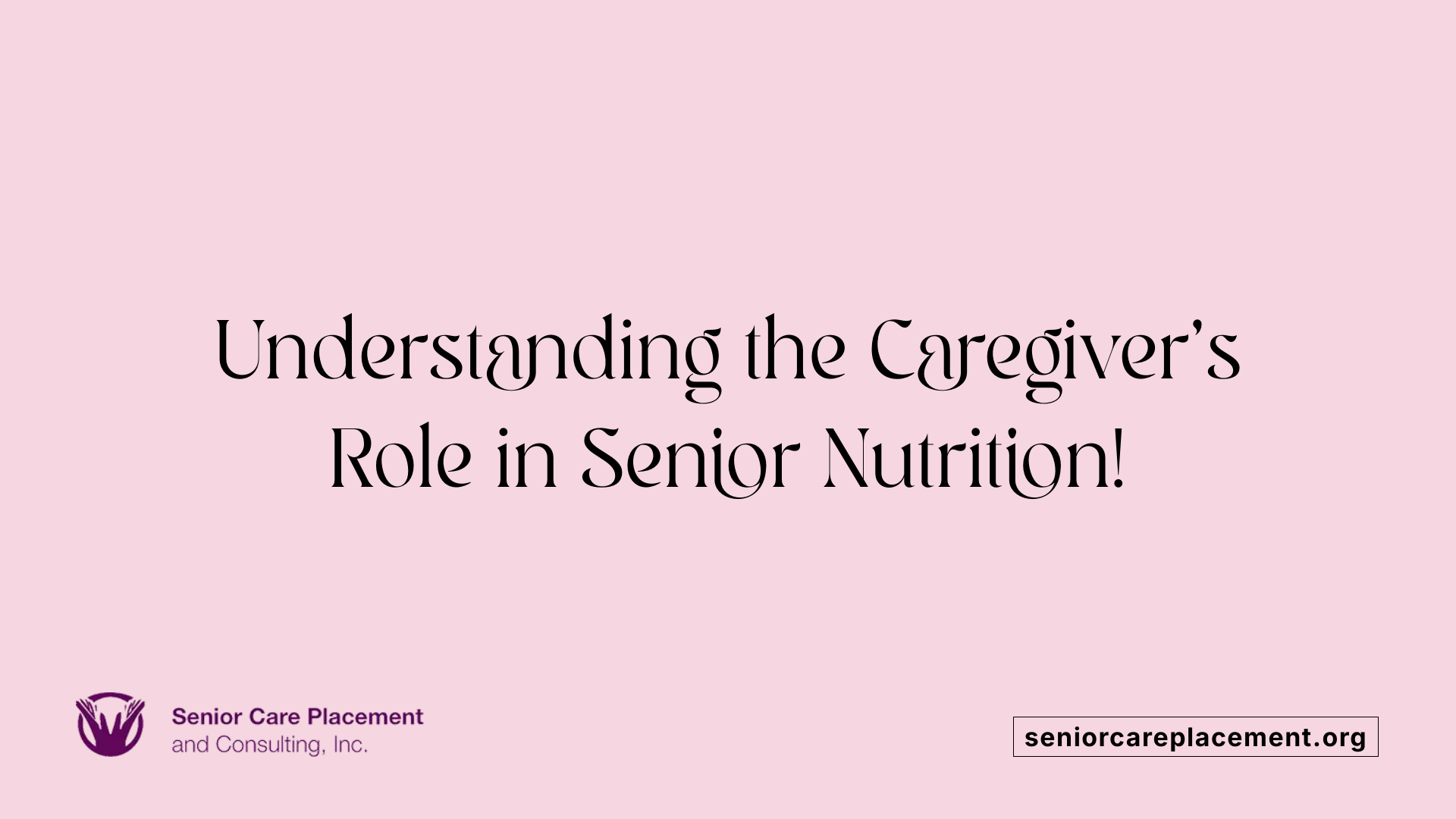How to Ensure Your Loved One’s Dietary Needs Are Met in Senior Care
Navigating Nutrition for Seniors in Care Homes

Understanding Elderly Dietary Requirements
Ensuring that elderly loved ones receive adequate nutrition while in senior care is a vital responsibility for caregivers and family members. With aging comes a variety of dietary challenges that can impact health and wellbeing. Our guide breaks down the essential elements of caring for senior dietary needs, offering insights into creating effective meal plans, consulting professionals, and recognizing the unique nutritional requirements of older adults.
Essential Dietary Guidelines for Seniors

What are the dietary guidelines for the elderly?
The dietary guidelines for older adults focus on emphasizing a balanced intake of various food groups while minimizing certain less beneficial elements. Seniors should prioritize:
- Fruits and Vegetables: Comprising half of the plate, these are rich in essential vitamins, minerals, and fiber.
- Whole Grains: A vital source of dietary fiber, they help with digestion and chronic disease management.
- Lean Proteins: Important for maintaining muscle mass, a minimum intake of 5 to 6.5 ounces per day is recommended, with favored sources including fish, poultry, beans, and legumes.
- Low-Fat Dairy: Crucial for calcium and vitamin D, aiding bone health.
In addition to including nutrient-dense foods, older adults should reduce consumption of added sugars, saturated fats, and sodium to mitigate health risks. Vitamins B12 and D are particularly critical, as their absorption diminishes with age, signalling a need for dietary adjustments or supplements.
Managing caloric intake
Although seniors require fewer calories due to reduction in metabolism and physical activity, their nutritional requirements remain heightened. A daily intake recommendation ranges from 1,600 to 2,200 calories for older women and 2,000 to 2,600 calories for men, emphasizing nutrient-dense options to fulfill their needs without overconsuming calories.
Importance of hydration
Hydration is another critical aspect of the dietary guidelines for seniors. Due to a diminished sense of thirst and possible medication side effects, many older adults may not drink enough fluids. Caregivers should encourage regular water intake, aiming for at least three to five large glasses a day. Additionally, including beverages like low-fat milk or fortified options can help meet hydration needs while providing necessary nutrients.
Improving Elderly Nutritional Status

How can you help the elderly improve their nutritional status?
To help the elderly improve their nutritional status, prioritize nutrient-dense foods rich in essential vitamins and minerals. Incorporating a variety of fruits, vegetables, whole grains, low-fat dairy, lean proteins, and healthy fats can significantly benefit their health. It's crucial to encourage seniors to reduce their intake of added sugars and sodium, focusing instead on flavorful herbs and spices to enhance meals without compromising health.
Effective Meal Planning
Meal planning plays a vital role in ensuring seniors receive balanced diets tailored to their dietary restrictions and preferences. Utilizing meal delivery services can be a fantastic resource for those who struggle with cooking or grocery shopping. Involving seniors in meal preparation fosters a sense of agency and enjoyment, turning meals into a social activity rather than a chore, which can enhance their emotional well-being.
Importance of Social Meals
Making meals a social event is vital for improving the nutritional status of seniors. Eating together can combat feelings of loneliness, making mealtime enjoyable and encouraging better eating habits. Regular companionship during meals can help stimulate appetite and provide emotional support, which is particularly important for those who may feel isolated.
By focusing on these areas, caregivers can effectively address the unique nutritional needs of elderly individuals, ultimately promoting their health and quality of life.
Practical Nutritional Strategies for Older Adults

What are some practical nutritional strategies for older adults?
Effective meal preparation is vital for older adults. It’s essential to prioritize selecting high-fiber foods such as whole grains, beans, and fruits. These options help in digestive health while ensuring plenty of nutrients are consumed. When cooking, avoid fried foods and instead opt for healthier methods like grilling or boiling, which retain more nutrients and reduce unhealthy fats.
Staying hydrated is crucial as well. Older adults should aim to drink enough fluids, such as water or vitamin D-fortified low-fat milk, to support overall health and bone strength. This is especially important since seniors may not feel thirsty due to age-related changes.
Portion control is another significant factor. Focusing on nutrient-dense foods helps provide necessary nutrition without excessive calories, which can aid in managing weight and prevent overeating.
How does exercise fit into nutritional strategies?
Regular physical activity plays a significant role in maintaining a healthy weight and improving overall health among older adults. Engaging in aerobic exercises and strength training is especially beneficial. Exercise not only helps in boosting metabolism but also improves muscle mass and bone density, which is essential as one ages.
How can managing portion sizes benefit seniors?
Controlling portion sizes helps older adults avoid excessive calorie intake while ensuring they receive essential nutrients. Planning meals in advance can assist in maintaining balanced nutrition and can be easier on the budget. It reduces the likelihood of impulsive eating behaviors that could lead to nutrient imbalances and ineffective meal choices.
Dietary Tips for a Healthier Senior Lifestyle

What are two dietary tips for the elderly?
Two dietary tips for the elderly include focusing on smaller, more frequent meals. This approach accommodates reduced appetite and energy needs, while also allowing for nutritious snacks throughout the day. A balanced diet covering all food groups—fruits, vegetables, lean proteins, dairy, and whole grains—should be emphasized to promote overall health.
Hydration is equally crucial; seniors should aim for six to eight glasses of water daily to prevent dehydration. Consider incorporating low-fat milk or fortified soy milk for added calcium and vitamin D. This can greatly support bone health.
How to limit salt intake?
It's advisable to reduce salt consumption to less than 6g per day. Instead, substitute salt with flavorful herbs and spices to enhance meals without compromising health. This healthier habit not only improves taste but also aids in managing blood pressure, which is vital for many older adults.
| Dietary Focus | Recommendations | Benefits |
|---|---|---|
| Calcium and Vitamin D | Aim for 3 servings of low-fat dairy daily | Supports bone health and prevents fractures |
| Small, Frequent Meals | Include snacks with nutritious options | Accommodates reduced appetite, maintains energy |
| Limit Salt | Use herbs and spices as alternatives | Enhances meal flavor, supports heart health |
By integrating these dietary tips, seniors can improve their overall well-being, maintain nutritional health, and enjoy their meals more fully.
Adapting Dietary Plans Based on Health Conditions
Why is it important to adapt dietary plans for seniors based on health conditions?
Adapting dietary plans for seniors based on health conditions is essential for several reasons. Tailored nutrition ensures that older adults receive the specific nutrients they need to manage chronic conditions such as diabetes, heart disease, or osteoporosis, which can enhance their overall health and well-being. Additionally, a well-planned diet can help prevent new health issues and mitigate symptoms of existing conditions, promoting better quality of life.
Managing Chronic Conditions and Nutritional Adjustments
For seniors with conditions like diabetes and heart disease, dietary modifications play a critical role. For instance:
- Diabetes: Focus on managing carbohydrate and sugar intake to stabilize blood glucose levels, including plenty of whole grains, fruits, and vegetables while avoiding processed sugars.
- Heart Disease: Implementing a low-sodium diet helps manage blood pressure. Incorporating healthy fats from sources like fish, nuts, and olive oil can also be beneficial.
- Osteoporosis: Prioritizing calcium and vitamin D-rich foods strengthens bone health. This can include low-fat dairy products and fortified foods.
High-Fiber Foods for Healthier Digestion
High-fiber foods are pivotal for seniors due to their benefits in digestive health and weight management. Recommendations suggest:
- Consuming 20-35 grams of fiber daily from fruits, vegetables, whole grains, and legumes to support digestive processes.
- Foods like oats, beans, and leafy greens not only ensure fiber intake but also enhance nutrient absorption while helping to prevent chronic diseases.
Overall, individualized dietary planning in conjunction with regular physical activity fosters a holistic approach to improving the health and longevity of seniors.
The Role of Caregivers in Maintaining Senior Nutrition

How can caregivers ensure seniors receive adequate nutrition?
Caregivers can ensure seniors receive adequate nutrition by preparing balanced meals that include a variety of fruits, vegetables, starchy foods, proteins, and dairy, following guidelines like the Eatwell guide.
It's important to adjust portion sizes since older adults generally require fewer calories.
Here are some specific strategies:
- Focus on Nutrient-Rich Foods: Meals should be rich in calcium, iron, and protein. Dairy products and lean meats, for example, are great for supporting bone health.
- Encourage Hydration: Ensuring seniors drink six to eight glasses of fluids daily is essential to prevent dehydration, particularly since many may not feel thirsty.
- Make Meals Social: Promote social dining experiences as they enhance meal enjoyment and encourage regular eating habits. Eating together can foster companionship and stimulate better appetites among seniors.
When should professionals be consulted for elderly dietary management?
Professionals should be consulted for elderly dietary management whenever significant health conditions impose dietary restrictions, such as diabetes, heart disease, or obesity.
Here are instances to seek expert advice:
- Complex Health Conditions: When creating a nutrient-dense meal plan tailored to health needs, personalized advice is invaluable.
- Ongoing Dietary Adjustments: Regular consultations help ensure that older adults consume sufficient fluids and maintain a balanced diet rich in essential vitamins and minerals throughout various life stages.
- Incorporating Activity: Guidance on physical activity is crucial for weight management and reducing chronic disease risks.
- Nutritional Deficiencies: When deficiencies are suspected or diagnosed, registered dietitians can formulate plans that prioritize key nutrients.
By employing these strategies, caregivers significantly influence the dietary health and well-being of their elderly loved ones.
Conclusion: Crafting Tailored Nutritional Plans
Addressing the unique dietary needs of seniors in care settings requires a compassionate and informed approach. By understanding the essential nutrients and practical strategies for enhancing dietary health, caregivers can tailor nutrition plans that support seniors' overall wellbeing. Consulting with professionals ensures that dietary needs are met comprehensively, guarding against age-related health issues and promoting a better quality of life for elderly individuals.
References
- How To Include Nutritional Management And Organization Into Your ...
- Nutrition Information for Older Adults - MyPlate.gov
- Nutrition for Seniors: Tips for Caregivers - WebMD
- Ways to Ensure Your Senior Loved One's Nutritional Needs Are Met
- How to Ensure Nutritional Needs for Elderly Parents Are Being Met
- How to Manage a Special Diet Plan in a Senior Living Facility
- Nutrition for Older Adults: Tips for Caregivers - Haven Health
- How to Manage Your Elderly Loved One's Dietary Restrictions -
- Elderly Care Service Providers Meet Meal Preparation Challenges





































































































